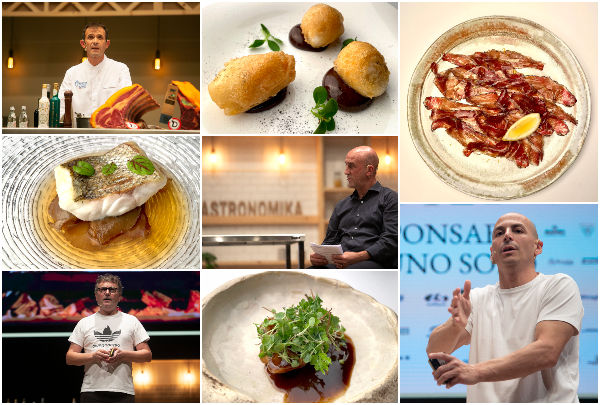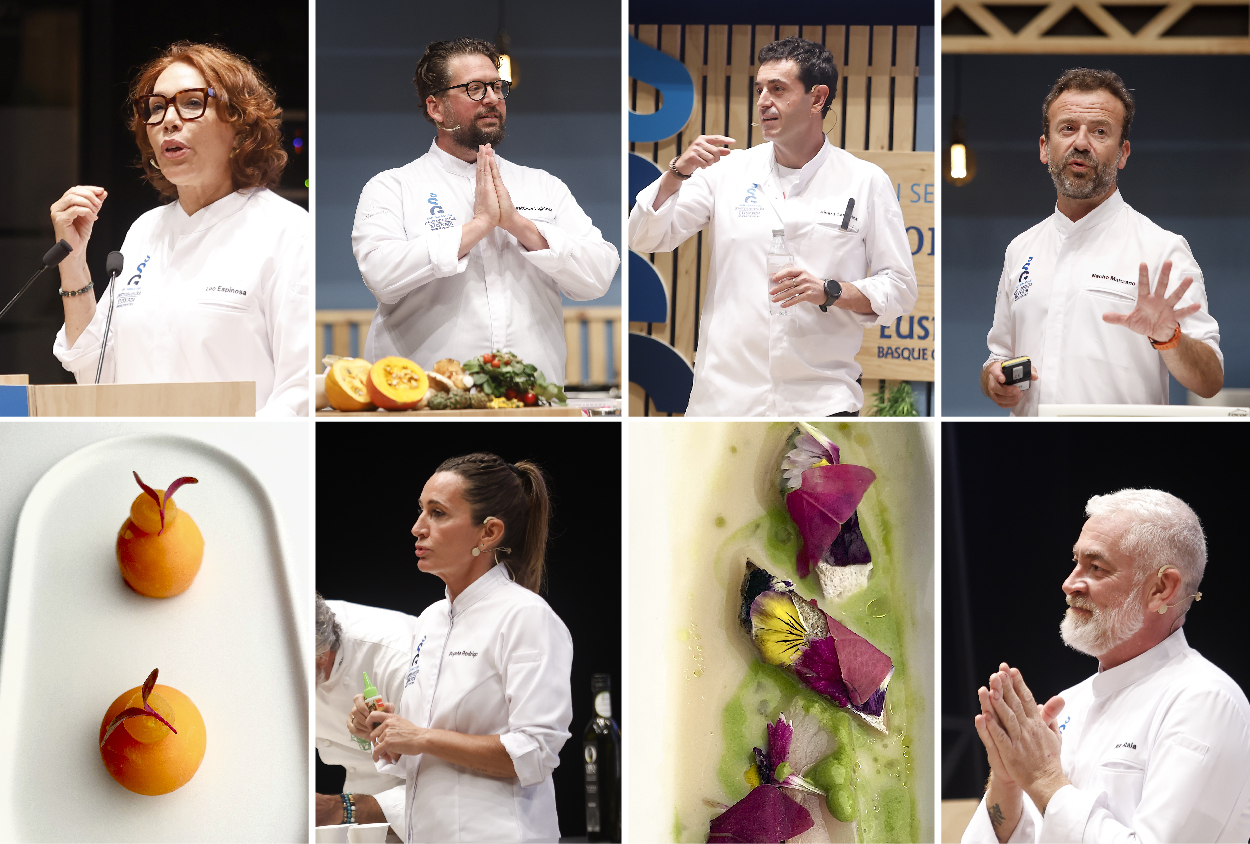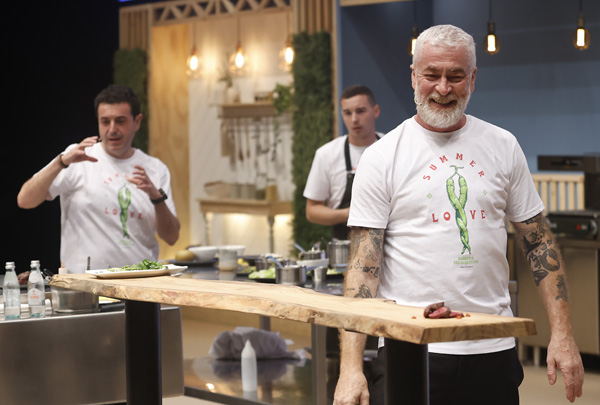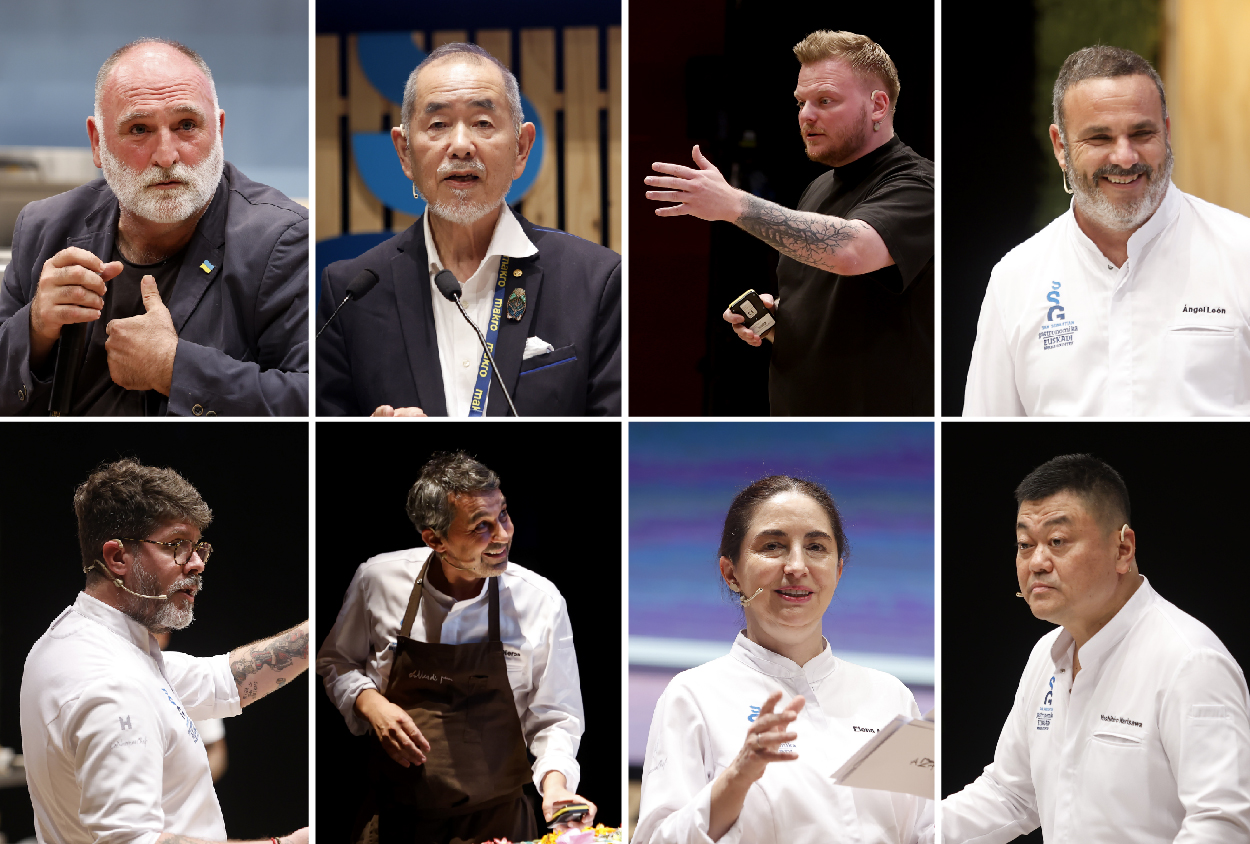News
Gastronomika'22 made a stand for the gastronomy of generosity against the gastronomy of competition

A return to the foundational spirit of congresses with leading chefs such as Albert Adrià, Ricard Camarena, Quique Dacosta, Oriol Castro and Pedro Subijana, humbling sharing their knowledge up close and personal.
The 24th San Sebastian Gastronomika Euskadi Basque Country came to an end on Wednesday, making a stand for the gastronomy of generosity against the gastronomy of competition. “Before this congress began, I thought it was going to be a transitional encounter between the pandemic and the 25th anniversary, but it has been an inspirational congress, truly inspirational", said Benjamín Lana, head of Vocento's Gastronomy division, alongside Roser Torras, the Gastronomika congress director, at the closing event.
This time around witnessed a return to the foundational spirit of what gastronomy congresses used to be. Cookery's leading lights took the stage not to deliver talks driven by ego, but to deliver humble talks up close and personal. But above all, with the spirit of service, in an attempt to assist their colleagues, with no godlike gestures, with generosity. Albert Adrià, Ricard Camarena, Quique Dacosta, Pedro Subijana, Andoni Aduriz, Aitor Arregi … ”Or Javi Estévez, with a recipe for the congress he will be putting on his menu, and Oriol Castro sharing all Disfrutar's knowledge in real time", added Lana.
They all confirmed the review of the role of gastronomy congresses, and made the 24th Gastronomika a congress for sharing, and not for competing. They arrived at the Kursaal with a single goal: to look their colleagues in the eyes as a team. “A new age giving us great hope for the 25th anniversary", concluded Lana and Torras before closing down this Gastronomika 2022.
A congress at which the slogan ‘United Kulinary’ aimed to oppose the break-off symbol of Brexit, making a stand for the culinary anti-Brexit with a gastronomy that knows no frontiers. And the longest standing international gastronomy event was back to show this, at a three-day event bringing together more than 70 chefs (32 with Michelin stars) and catering professionals in 40 talks - with the return of a wine-tasting format - and 30 concurrent activities, bringing in a large audience (12,131 people accredited, 1,318 congress-goers from 32 countries, over 10,000 sampling experiences, 152 exhibitors and 371 accredited journalists).
On the last day, the British accent was supplied by Nieves Barragán (Sabor, London), a pioneer of cooking Spain in the British capital; Miguel Ángel Mayor (Rioja, Glasgow), the chef who reaped success in Valencia con Sucede*, now focusing on tapas and cocktails in Scotland, and Isaac McHale. The chef at The Clove Club** (London) cooked two recipes with semi-raw sardines and scallops, which are "excellent products in England”. “When I started out (McHale was at Gastronomika 2013), I thought I would be a very technical chef, but after a while I realised that the most important factor was the ingredients, the little details". “Product, respect and countryside”. A message echoed by all the British chefs.
Meat, the main exponent of the last session
The last round of talks at Gastronomika also focuses on product, but not on a country, on a cooking technique used in many countries: meat and grilling.
The Mugaritz chef reflected on fire as a tool around which he based his new restaurant Muka, one of the elements "that has guided us throughout our lives", "but an element that is disappearing", said Argentinian writer Martín Caparrós, whom Andoni Luis Aduriz asked to participate online. “Fire has given us everything", the writer went on. "We have always had a relationship with fire, but that is no longer the case. Fire is no longer the central space of rich countries. There is no fire in our homes any more, not even matches. Even the cars are electric. There is no fire in our lives any more. It now occupies a nostalgic space. And this is a radical change. Now perhaps fire is only important in good kitchens". Like Muka's.
And like the kitchen in Elkano* (Getaria), the great Gipuzkoa grill house, whose grill master Aitor Arregui dwelt on the whys and wherefores of the grill and of his restaurant. He was accompanied by Pablo Vicari, chef at Cataria, the restaurant Arregi opened four years ago in Santi Petri (Cádiz), bringing the taste of the grill to other latitudes.
“Meat is being demonised, and this is not right. Beef is the only foodstuff that captures more carbon than it emits. It's being criticised now, but the overall solution is biochemistry and regenerative livestock breeding so that cattle can graze together and fertilise the fields." This system "which must help the planet" was explained by Buenos Aires' most famous grill man (Don Julio, #14 according to The World’s 50 Best), Pablo Rivero, who issued a call for this system to be used in a community, the Basque Country, "which I love, because it cares for its gastronomy like we do at home".
Finally, Jon Ayala (Laia Erretegia, Hondarribia) showcooked a beef chop to demonstrate the chop's different muscles (flank, feather and heart). “We are the only restaurant that works with them and presents them separately. That's the way it has to be. They're different kinds of meat", he said.
“Spain is Europe's most interesting wine producer”
At the noon session, writer, journalist and Master of Wine Sarah Jane Evans took the Pau Albornà i Torras Gastronomy Journalism Award. The British participant, with an impressive professional CV and longstanding relations with Spain, confessed she was "very moved. For the award and because it's in Spain, Europe's most interesting wine producer". And among all the country's wines, she plumped for sherry. “When I was a student in Cambridge I drank a lot of sherry, which is like my mother's milk to me. It's in my heart”. Evans rounded off her talk with a wish, "for my work in Spain to never end, because it's a fascinating country".
Wednesday's competitions
The last day of the congress saw the 19th International Award for Cooking with Extra Virgin Olive Oil and the 13th National Grill Award. The event's longest standing competition gave the award to Ramón Lertxundi from Saizar Sagardotegia (Usurbil, Guipuzkoa) as best grill man of 2022, and Discarlux as the best meat. Diana Díaz Garrido (El Invernadero*, Madrid) took the 2022 Oil Chef Award.
Tenerife was also a feature of Gastronomika on Wednesday, with the 2nd National Tenerife Tropical Fruit Dessert Competition award - won by Il Bocconcino in Adeje (Santa Cruz de Tenerife) - while chefs Laura Suárez (Haba Tonka, La Orotava) and Jesús Camacho (Donaire, Santa Cruz de Tenerife) gave a joint talk on the island's hugely "sweet" present.
From the best ceviche to à la minute cuisine at Bardal
“Ceviche has been developing over the years. The first time I went on stage at San Sebastian Gastronomika 15 years ago, I presented a traditional ceviche. It wasn't very well known, and at the time nobody thought it would become such a popular recipe", said Gastón Acurio, the father of the revolution of Peruvian cuisine, back in San Sebastián, “my home”. The talk continued in the company of colleagues who cooked different versions of the recipe, a recipe which has not only become more popular and universal, but "has been adapted and reproduced with local ingredients. A perfect metaphor of what has been going on in the world of gastronomy in recent years", he added.
The point was not the recipe, but rather Benito Gómez's style of cooking. About to move Bardal to the mountains of Ronda, the Catalan explained restaurant's two-star cuisine: “produce, stock and dressings”. Cuisine where everything seems simple, "mainly because I don't like recipes with a lot of ingredients", he explained, "a daily protein-filled mise en place cuisine. I have a hard time with vegetables, but I'm getting there ...".




.jpg)
.jpg)

.jpg)
.jpg)


.jpg)









































